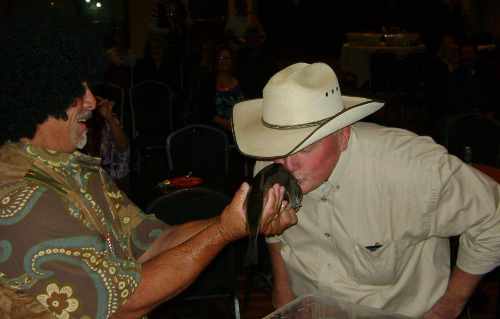LAKEPORT, Calif. – A quarter century after he shot to death a man who begged for his life, a state prison inmate has been denied a compassionate medical release by a local judge.
Following an hourlong hearing Wednesday morning, Judge Andrew Blum denied the request for a compassionate release for 65-year-old Carl Hampton Wade, said to be terminally ill due to heart and lung disease.
“In this court's view, Mr. Wade is exactly where he belongs. He's in custody and he should stay there,” said Blum.
Wade – currently housed at the California Medical Facility in Vacaville – signed a waiver of his presence and did not attend the hearing, where attorney Komnith Moth represented him.
Wade is serving a 16-years-to-life sentence for murdering John Karns on June 6, 1986.
Wade only began serving his sentence for first-degree murder in 2004 after receiving a 16-year sentence in Colorado. He had fled there after Karns' murder and shot another man, who survived but suffered longterm injuries, according to Chief Deputy District Attorney Richard Hinchcliff.
Under a California law established in the 1990s, state prison inmates who have not been sentenced to death or life in prison without parole may receive a recall of sentence – or compassionate release – if they're terminally ill and expected to die within six months, said California Department of Corrections and Rehabilitation spokesperson Terry Thornton.
A later addition to the law allows for prisoners who are “permanently medically incapacitated” – or require 24-hour care – also to receive compassionate release, according to a California Department of Corrections and Rehabilitation fact sheet.
The law allows for the Board of Parole Hearings to suggest recall of commitment to the courts where the prisoners were sentenced. “They're the ones who ultimately decide,” Thornton said.
Since 1991, 1,154 such cases have been submitted to state prison officials, with courts recalling sentences in 344 of them, according to statistics provided by Thornton.
She added that compassionate release is not to be confused with the law passed last year allowing for medical parole for inmates who are severely incapacitated and no longer pose a threat to public safety. In those cases, if the parolee recovers, they would be returned to prison.
The Board of Parole Hearings voted 10-1 at an Oct. 18 hearing to refer Wade's request for release to the Lake County Superior Court, according to the hearing's minutes.
Blum said he was not convinced by the evidence provided by the state Board of Parole Hearings that Wade's medical condition was as portrayed, or that he would not be a danger, explaining that the state board had done little inquiry on Wade's proposed living situation with family members.
Quarrel leads to shooting
Hinchcliff argued against the release, focusing most of his time on the ethics of such a decision.
He explained that on the day of Karns' murder, Wade and Karns had gone drinking, quarreled, then went back to Wade's home to drink and cut wood.
There, a third man watched as Wade – who had been antagonizing Karns earlier, leading to Karns punching him – shot Karns while he was on the porch, Hinchcliff said. The witness got the gun from Wade, but neither made an effort to help Karns, who had been shot through the torso and was on his knees, bleeding.
Wade then got the gun and shot Karns in the head, burying his body the next day. By the time Karns' body was discovered 13 days after the shooting, Wade had fled the state, according to Hinchcliff.
Wade eventually ended up in Aurora, Colorado, where on Nov. 9, 1987, he and a friend, William Wiler, got into an argument while drinking. While the two men were riding together in a car, Wade pulled out a .38-caliber handgun and shot Wiler in the face, breaking his jaw, crushing vertebrae and leaving him with brain damage, Hinchcliff said.
Colorado authorities arrested Wade for Wiler's shooting. He received a 16-year sentence there and later was extradited to Lake County, where he received 16 years to life. Hinchcliff said the sentences ran consecutively, giving Wade a total of 32 years to life. He isn't due for parole consideration until 2019.
Hinchcliff, who had just found out about the release request last week, was able to track down Karns' two sisters and mother, who live in Lakeport, so they could attend the hearing.
Sisters recall brother's loss
During the Wednesday hearing, Karns' mother, Shirley, did not testify, but his younger sisters – Lucille “Cindy” Karns and Robann Karns Hill – both took the stand to appeal to the court not to release Wade.
For both women, their brother's stolen life has left holes in the fabric of their family.
“It robbed our whole family of a sense of security,” Cindy Karns said of her brother, who was 30 years old when he died.
She said her brother had been staying with Wade at a residence on Elk Mountain Road, and had said a week before his death that he was moving back with his family because Wade had some “really big issues.”
Cindy Karns said she has suffered with her own health problems, and does feel sorry for Wade, but added that she and her children worry that if he's released he might harm them. “This was a very violent man,” she said.
“The bottom line is, I'm serving a life sentence,” she said, adding that Wade is supposed to be serving a life sentence, too. “I don't want him out.”
Robann Karns Hill called the death of her big brother “devastating,” explaining that he was a father figure as well as a friend.
She recalled getting the call that her brother was missing, and later having to tell her mother that he was gone forever. “That was the most terrible thing to have to tell somebody.”
When his body was found nearly two weeks after his murder, officials had to use his tattoo to identify his badly decomposed body, she said.
Robann Hill said there was no chance to say goodbye, “and then it was years waiting, knowing that Carl was out there.” She said he had made several advances to her which she rebuffed, and she feared he would come back to hurt her or someone else.
“I feel there was no compassion given to my brother,” she said, describing how he was on the ground, begging for his life, when Wade shot him the final time.
'He did not show compassion to other people'
Moth argued that there was ample evidence that Wade qualified for the release due to his heart and lung conditions, which leave him chronically short of breath and require that he be on oxygen at all times.
He said Wade will probably spend most of his time in a bed or wheelchair, and added that four doctors had assessed Wade and testified he was terminally ill with less than six months to live.
Wade's sister, niece and nephew were going to care for him and had guaranteed that he would be supervised at all times, Moth said.
“It's undeniable that the crime itself was a horrific, serious crime,” said Moth, but he argued that so many years after Karns' murder, “Mr. Wade is not the same person as he was during that time period.”
Moth said Wade remained discipline free in prison and had no history of violent behavior during his time there, but Hinchcliff argued there was no evidence that Wade had taken classes on alcohol abuse or that he would not pose a threat to public safety.
“He did not show compassion to other people. He has done nothing to earn the compassion of this court,” said Hinchcliff.
Hinchcliff presented information to show that Wade had a violent history that went back farther than Karns' murder.
In February 1978 Wade's then-wife called the Sacramento County Sheriff's Office because he was tearing up their home, Hinchcliff said. When deputies arrived, Wade – armed with a spear gun – threatened to kill them, and was holding his children hostage. He also was arrested for that incident.
Judge not persuaded by state's evidence
Blum said he was required to make two findings: that Wade was terminally ill and that he didn't pose a risk to public safety.
He said the packet the Board of Parole Hearings supplied to him didn't contain a medical report, just a summary. “I would have liked actual medial reports, including previous medical reports showing the trajectory of his disease.”
Blum said the court had received a letter exactly six months before the hearing from Wade's sister, stating that he had six months to live and asking for his release.
“I can't help but look at that and wonder how valid the current prediction is that he has six months left to live,” said Blum, who didn't find the evidence at all persuasive.
As to public safety, Blum said he was surprised as the superficiality of the Board of Parole Hearings' analysis on that point. State officials had not visited the home where Wade was to be kept, and as for his family, “They've never had custody of this individual, they've never had care of this individual, they don't know what it takes.”
Wade's sister, Blum noted, is deaf. “He could wheel himself right out of the front door and she would never know,” he said, adding that it also wasn't clear if alcohol or firearms are present in that home.
“When he drinks he's extremely dangerous,” Blum said of Wade.
Blum's assessment of Wade was that he committed “extremely vicious” crimes, that were cold-blooded, premeditated “and absolutely senseless.”
Even if Blum had found Wade was terminal and harmless to society, the decision to recall the sentence, ultimately, was at the court's discretion.
Blum concluded that Wade should stay in prison, and adjourned the hearing.
E-mail Elizabeth Larson at This email address is being protected from spambots. You need JavaScript enabled to view it. . Follow Lake County News on Twitter at http://twitter.com/LakeCoNews, on Tumblr at www.lakeconews.tumblr.com, on Facebook at http://www.facebook.com/pages/Lake-County-News/143156775604?ref=mf and on YouTube at http://www.youtube.com/user/LakeCoNews .












